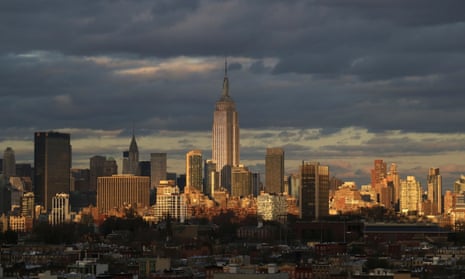Scoff all you like at hoverboard hipsters and Brooklyn baristas: life is tough for millennials trying to chase down their American dream in New York City. The city’s millennials make about 20% less than the generation before them, according to a new report released by New York City comptroller Scott Stringer.
Entering the workforce during the greatest economic downturn in living memory, millennials – despite attending college at much higher rate than Gen X – have been stuck in low-wage jobs and might never make up that 20% gap.
The report defines millennials as those born between 1985 and 1996.
“This generation is at a crossroads,” Stringer said. “They worked hard, got an education and then faced roadblocks to getting a good-paying job. It’s time for us to pay attention to the largest generation in New York City, and start to break down those barriers.”
The public has been paying attention to millennials, but mostly the attention has been on the fact that they choose juice shots over alcohol or that they ride hoverboards while at work. Less attention has been paid to the fact that there is a reason why co-living spaces with month-to-month leases make sense for the generation that isn’t sure if it’s coming or going. It isn’t love of coffee that has millennials with college education taking jobs as baristas.
“The percentage of young adults working in low-wage industries who have a bachelor’s degree grew from 23% to 33% between 2000 and 2014,” the report found.
And while low-wage industries have hired more young people over the years, they have also lowered their wages. The report found that while hospitality and retail sectors created 91,000 new jobs for young people, wages in the two sectors fell by 16% from 2000 to 2014. The arts and entertainment sector, which is considered a mid-wage employer, hired 16,000 millennials during that same time – but their income fell by 26%. And while wages in finance went up by 14%, the jobs available to millennials dropped by 11,000.
“Millennials were applying for jobs in the most difficult economic climate since the Great Depression and as a result, a growing number are now working in low-wage industries and earning less than their predecessors,” Stringer said. “This group of young people is confronting unique economic challenges that their parents did not have to face. Every generation is expected to do better than the last, but too many millennials are not getting a fair chance to make it in New York City.”
This trend of being an underemployed millennial is also not unique to New York. A recent report released by the left-leaning Economic Policy Institute found that for recent college graduates, aged between 21 and 24 years old, the underemployment rate was 12.6%, compared to 26.8% in 2007.
“A third of young high school graduates are underemployed and one in eight young college graduates is underemployed. Those are improvements from last year, but nowhere near the economy of 2000,” Teresa Kroeger, one of the authors of the EPI report’s authors, told the Guardian. The economy of 2000, by some standards, is when the economy has been at its best in the recent history.
Not only are these millennials working jobs that do not require the college degrees they have spent years obtaining, but they are also burdened with debt.
Those living in New York’s five boroughs owe about $14bn in student loans, according to Stringer’s office. “Nationwide, total student loan balances held by all borrowers under 30 years old increased at nearly a 10% annual rate between 2005 and 2014, reaching $369bn,” it said.
Sorry, millennial Carrie Bradshaw wanna-bes, it’s student loan bills for you instead of those Gen X Manolo Blahniks and Louboutins.

Comments (…)
Sign in or create your Guardian account to join the discussion